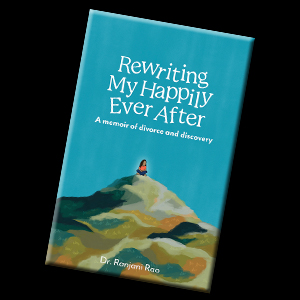MyTurn: Ending Leads to New Beginning

On the day I received the first draft of the divorce application, my first feeling was relief. After years of being on the fence, I was finally on a path that was now irreversible. The moment felt important. Yet I felt alone. Within my family, I had claimed many firsts: first one to drive a car, first woman to earn a doctorate, and now I would be the first divorcee. Relief was replaced by regret.
There was no honor or pride in claiming this spot. It was a badge of failure. Like my height and skin color that were intrinsic to me, attributes that I could not change, this would become an identifying characteristic etched into my psyche forever. Is this what I really wanted?
I recalled an early conversation with Sunil the counselor: “Do you have any happy memories of your marriage?”
“Yes,” I answered in a heartbeat.
“Tell me about them,” he said.
I recounted the memorable visit to New York City on a freezing December afternoon just before my first Christmas in the United States. The city looked festive, lit up for the holiday season in the early darkness of a winter night. At the top of the World Trade Center building, which supposedly had the best view of the city, there was zero visibility. We could only see our faces reflected in the thick glass. We stepped out of the
building, disappointed. We drove over to Rockefeller center, which looked like a postcard for a winter wonderland, glittering with a towering Christmas tree and skaters. The bull of Wall Street looked forlorn and imposing. Steam gushed out of underground vents, startling me with their sudden shoosh.
When spring arrived, we returned to the city and visited the Statue of Liberty. Our friends from New Jersey visited us in D.C. for the cherry blossom festival. Years later, we soared in a hot air balloon over vineyards in Napa, took a helicopter ride over the Grand Canyon, and took pictures of Paris from the top of the Eiffel Tower.
The most unforgettable and miraculous memory, of course, was the sight of an aloof husband transforming to a doting father in a blink of an eye in the delivery room in California.
Of course, there were many.
Sunil observed me closely but didn’t say much.
Changing my narrative from one of complaint and dissatisfaction to a more positive one changed my mood, but it didn’t change all the other negatives that had tipped the balance of our marital life into dysfunction. Memories of good times were a reminder that life cannot be measured in purely black and white terms. The good and bad coexist in a tenuous equilibrium that is always in flux.
All of this didn’t change the fact that I had to prepare for a meeting with the lawyer to discuss the terms of the divorce.
I knew it would be best to leave my family out of legal discussions. My brothers had busy lives. My recently widowed father was already grappling with a major life change that had taken away not just his wife but separated him from his beloved Mumbai. From being the patriarch of his family, he had become a temporary visitor in the homes of his caring yet distracted children.
It was time for me to run on my own.
I didn’t speak much at the first awkward meeting with the lawyer. All I wanted was Shreya’s custody, which to my great surprise (and relief) had been assigned to me in the first draft. I agreed to not ask for anything else, not even a share of the house that had been built with our joint savings. There wasn’t much to discuss except a quick exit.
“We will file the mutual consent petition in family court soon. Then it goes into a six-month waiting period,” the lawyer said. Six more months!
We had been living apart for three years, except for a brief, disastrous interlude. But the law was not adept at nuances. Although it could be expedited, the suggestion was to wait.
Eight months later I signed the paper in the presence of the judge.
After nineteen years, six months, and eighteen days of being legally married, a sad looking piece of paper erased almost half of my life.
I had not worked this long and this hard at anything in my life. The years pursuing a PhD, the effort of tackling infertility, and the travails of being a working mother—none of it compared to this pain of abject failure.
Who could I blame? My father? The surviving parent who had supported the arranged marriage that had ended like this?
Who could I rage against? Fate? For handing me these lousy cards and setting me up for failure?
How would any of it help?
Growing up requires many things. Forgiveness is foremost—of self, of others. Forgiveness, and acceptance of what is.
I was officially a divorcee. I had to accept it. I had to grow up.
“Is it done?” Dada asked when I stepped in through the door.
“Yes,” I replied, our gazes meeting.
He looked at me for a long moment and nodded.
And in that instant, I became an adult.
Reprinted from Rewriting My Happily Ever After: A Memoir of Divorce and Discovery with the permission of Story Artisan Press. For more, go to www.ranjanirao.com
Enjoyed reading Khabar magazine? Subscribe to Khabar and get a full digital copy of this Indian-American community magazine.
blog comments powered by Disqus














